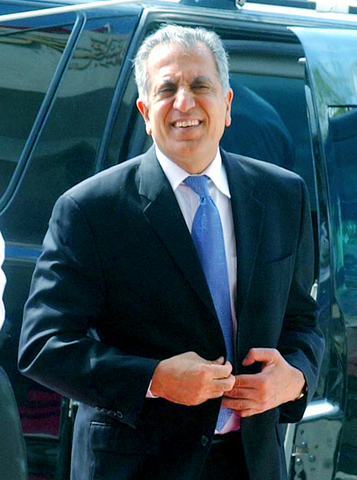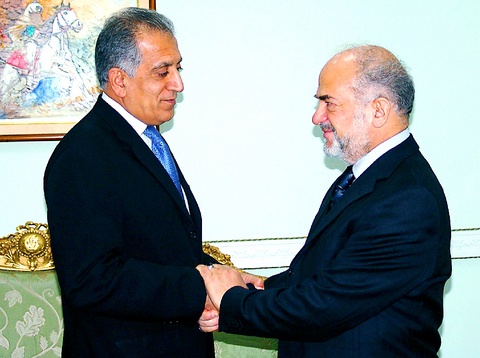On the morning of Sept. 11, 2001 Condoleezza Rice was chairing a meeting of the national security council in the White House. By the time the assembled foreign policy wonks saw the second plane hit the World Trade Center, it was becoming clear that the US was being attacked by al-Qaeda and the country was at war.
From that moment on, a previously obscure staffer became the center of attention, bombarded with questions. His name was Zalmay Khalilzad, and the country of his birth, Afghanistan, was about to become a war zone.
Since then Khalilzad, who became an American citizen in 1984, has become the country's most indispensable diplomat. He was in Kabul just after the fall of the Taliban and in Baghdad days after the first US troops reached the Iraqi capital. When postwar Afghanistan was in danger of being torn apart by warlords in 2003, he was appointed ambas-sador to Kabul to help prop up Hamid Karzai and oversee elections.

PHOTO: AP
Last June, when Afghanistan appeared relatively stable but Iraq was imploding, he was transferred to Baghdad. His title there is ambassador, but he is more of a viceroy, with 5,000 staff in the biggest US embassy in the world and backed by more than 130,000 US troops.
It is an unenviable job. For the insurgents, Khalilzad represents the highest value target possible, and on the few occasions he ventures outside his offices in Saddam Hussein's former marble presidential palace and out of Baghdad's Green Zone, he must do so with a small army around him, complete with air support.
But he has been strikingly successful. He was acclaimed for brokering a constitution last year, a feat that frequently involved improvising US policy on the spot. "I know he has considerable sway. I saw it first hand," said Peter Galbraith, a former US diplomat who advised the Iraqi Kurds during the drafting of the constitution. "His predecessors were visiting the leaders, repeating the talking points."

PHOTOS: AP
He had the clout to call up the National Security Council, a former NSC colleague said. "Most feel that he is a breath of fresh air in Baghdad after the rather stale immobility of the [John] Negroponte period." Khalilzad's predecessor is now director of national intelligence.
It is easy to see why Khalilzad is essential to the US effort in Iraq. He combines the commitment of a Washington neoconservative with the cultural sensitivity of his foreign roots. He is a Muslim, born in 1951 in Mazar-i-Sharif, where his father was a middle-ranking civil servant married to an illiterate but strong-willed woman who appears to have been a significant influence on his life.
He told the New Yorker magazine his mother "could not read or write herself, but she would have the kids read the newspapers to her."
"I think if she had been born at a different time she would have been quite an established political figure," he said.
Urged on by his mother, the young Khalilzad won an exchange scholarship to California for a year at the age of 15, and then, after he finished school, to the American University in Beirut. His background gives him a familiarity with the Arab negotiating style.
Unlike most American diplomats, he is prepared to sit chatting for hours, fidgeting with prayer beads, and listening to local leaders.
Khalilzad's path keeps getting steeper. He has to square the circle of US policy in Iraq, coaxing Shia leaders to cede some power to the Sunni minority in order to form a government, while extremists on both sides are murdering each other. It is little wonder that the US' man in Baghdad is drifting off message. While the White House and the Pentagon have been pumping out mostly happy talk on Iraq, Khalilzad has become outspoken about the scale of the problems facing the country and more apocalyptic in his predictions.
This week, he told the LA Times that the invasion of Iraq opened a Pandora's box of sec-tarian conflict with the potential to erupt into full-scale civil war.
Khalilzad's experiences in Baghdad have led him to voice some doubts over the timing of the invasion, and he is said to believe that the postwar period was handled abominably, but his conviction that Saddam had to be removed appears unshaken.
His faith in US military power as a vehicle for democratic change was passed on by Albert Wohlstetter, a foreign policy guru at the University of Chicago, where Khalilzad arrived in 1975 from Beirut to work on a doctorate. Professor Wohlstetter's proteges read like a who's who of the neoconservative movement, including Paul Wolfowitz and Richard Perle.
As a leading graduate of the neoconservative school, Khalilzad is now in a unique position. Most of the others who pushed for invasion have moved on.
Wolfowitz is running the World Bank. Perle is a private sector consultant. Meanwhile, Khalilzad has stayed on to face all the messy consequences.

Taiwan has next to no political engagement in Myanmar, either with the ruling military junta nor the dozens of armed groups who’ve in the last five years taken over around two-thirds of the nation’s territory in a sprawling, patchwork civil war. But early last month, the leader of one relatively minor Burmese revolutionary faction, General Nerdah Bomya, who is also an alleged war criminal, made a low key visit to Taipei, where he met with a member of President William Lai’s (賴清德) staff, a retired Taiwanese military official and several academics. “I feel like Taiwan is a good example of

March 2 to March 8 Gunfire rang out along the shore of the frontline island of Lieyu (烈嶼) on a foggy afternoon on March 7, 1987. By the time it was over, about 20 unarmed Vietnamese refugees — men, women, elderly and children — were dead. They were hastily buried, followed by decades of silence. Months later, opposition politicians and journalists tried to uncover what had happened, but conflicting accounts only deepened the confusion. One version suggested that government troops had mistakenly killed their own operatives attempting to return home from Vietnam. The military maintained that the

Taipei Mayor Chiang Wan-an (蔣萬安) announced last week a city policy to get businesses to reduce working hours to seven hours per day for employees with children 12 and under at home. The city promised to subsidize 80 percent of the employees’ wage loss. Taipei can do this, since the Celestial Dragon Kingdom (天龍國), as it is sardonically known to the denizens of Taiwan’s less fortunate regions, has an outsize grip on the government budget. Like most subsidies, this will likely have little effect on Taiwan’s catastrophic birth rates, though it may be a relief to the shrinking number of

Since its formation almost 15 years ago, Kaohsiung rock band Elephant Gym (大象體操) has shattered every assumption about contemporary popular music, and their story is now on screen in a documentary titled More Real Than Dreams. It’s an unlikely success story that says a lot about young people in Taiwan — and beyond. For a start, their sound is analog. In the film, guitarist Tell Chang (張凱翔) proudly says: “There is no AI in our sound.” His sister, bass player KT Chang (張凱婷) is the true frontwoman — less for her singing abilities than for her thunderous sound on the instrument. Fast like